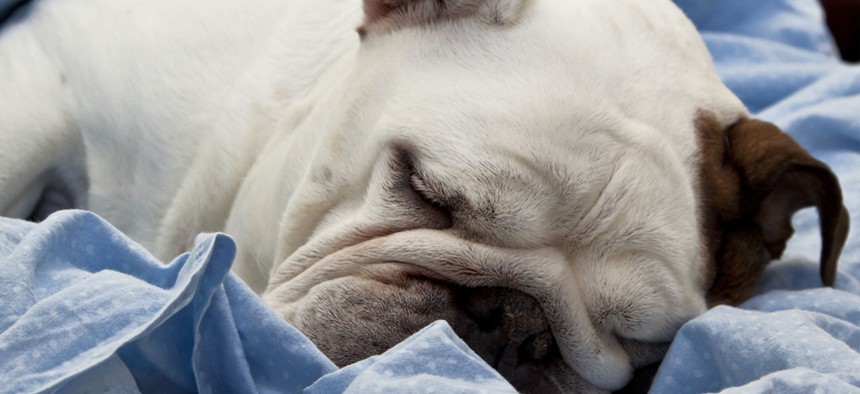
David Persson/Shutterstock.com
Science May Explain Why Too Little Sleep Makes Us So Emotional
Do restless nights make us more emotional, or do emotional states disrupt our sleep?
If you’ve ever tossed and turned at 3am, you can probably attest to the fact that sleepless nights lead to bad mornings. Every minor mishap seems to set you off. You might snap at your spouse for forgetting to buy coffee filters, respond brusquely to a well-meaning co-worker, or blink back hot tears after an awkward encounter. The next night, you’re awake in bed again, reviewing the day’s missteps and falling even further behind on the rest you badly need.
The rocky emotional territory of insomniacs is familiar to many. But it often seems like a chicken-and-egg problem: Do restless nights make us more emotional, or do emotional states disrupt our sleep? Recent research may be able to shed some light on the subject.
A 2015 study of some 2,000 Swedish adults, published in the British Journal of Health Psychology, examined the relationship between a person’s ability to regulate their emotions and the development of insomnia over time. At the beginning of the study, participants’ ability to regulate their emotions seemed to have no effect on their sleeping patterns. But six months and 18 months after the initial survey, the study found that people who were less able to manage their emotions were also more likely to experience persistent insomnia. This happened even for people who began the study without sleeping problems.
The study suggests that emotional turmoil may be at least partially responsible for insomnia. That said, “it’s way more complex than just a simple cause—it’s probably different for different people,” says Markus Jansson Fröjmark, the lead author of the study. He notes that the study only shows a slight relationship between dysfunctional emotional regulation and insomnia. And some studies have even suggested that sleep deprivation can make people feel happier, although this is probably a temporary effect.
However, it does appear that the longer the sleep deprivation continues, the more negative emotions people experience, according to Fröjmark.
Fröjmark hypothesizes that how you feel after too little sleep may depend in part on whether you had a choice in the matter. People who stay up late to work on pet projects or binge-watch the latest season ofHouse of Cards have made a voluntarily decision to forego some sleep. Insomniacs, on the other hand, have a clinical condition: They want to sleep but can’t. This may contribute to their bad moods.
Other studies have also taken a look at possible links between sleep deprivation and emotional disruption. Researchers from Tel Aviv Medical Center in Israel observed 18 people to see how the parts of their brains that process emotion would respond to negative and neutral pictures. The neutral images showed objects like a spoon on a table, while negative pictures included things like mutilated bodies and snakes.
The researchers found that the emotional networks in the brains of people who were well-rested reacted normally when viewing negative and neutral images. But after the same people underwent 24 hours of sleep deprivation, their brains lost the ability to discriminate between negative and neutral images. Instead, they reacted in an emotional way to both kinds of pictures.
“We were actually surprised,” says Eti Ben Simon, the lead author of the study. “We thought that neutral would remain neutral—that people [after being sleep deprived] would be much more sensitive to negative stimuli.” Instead, sleep deprivation made people more emotionally reactive to things that should have been regarded as neutral. While the study used a small sample size, its findings could help explain life outside the brain scanner. People stumbling around on a few hours’ sleep may be more prone to view everyday occurrences in their lives emotionally.
In essence, just as the body’s internal clock that determines our sleep-wake cycle regulates so many bodily functions, it probably also allows us to keep our emotions in check during our daily lives. A good night of sleep helps us to remember that a spoon is just an object, not something to cry about.
“The reason we are able to consider something as neutral is because we have a good regulatory mechanism that always regulates our behavior and our emotional responses,” says Simon. “Without sleep, this part of the brain gets tired… so everything could trigger an emotional response.”
Taken together, these studies seem to suggest that sleeplessness and increased emotionality are part of a self-perpetuating cycle. Simon suggests that attempting to improve the quality of people’s sleep could enhance their emotional regulation and help researchers better understand the interplay between sleep and emotions. Many people have already turned to cognitive behavioral therapy (CBT) for help getting a good night’s sleep, using practices such as keeping a sleep diary, maintaining a set bedtime, or getting out of bed after 20 minutes of lying awake. These techniques aim to help people get more rest by establishing good routines.
So while science doesn’t have a clear answer to the chicken-and-egg problem of sleep just yet, one thing is clear. “I cannot stress enough how sleep is really important for emotional health,” says Simon. “I think that we take it too lightly; it seems to kind of be the last priority. I think that we should give it higher priority if we want to live a healthy life, emotionally and psychologically in general.”
NEXT STORY: The Easy 10-Second Tax Return






